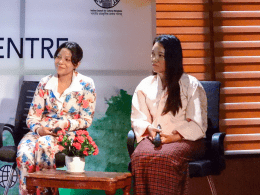Prime Minister Tshering Tobgay has called for a reformed and more inclusive United Nations Security Council (UNSC), backing India and Japan as deserving candidates for permanent membership. Addressing world leaders at the 80th session of the United Nations General Assembly (UNGA) in New York, the Prime Minister said that global institutions must evolve to reflect today’s realities.
“Bhutan supports reform of the United Nations, including reform of the Security Council, expanding both permanent and non-permanent membership. A reformed Security Council must include deserving nations such as India and Japan alongside other capable and leading countries to reflect today’s complex realities,” he said in his address.
The Prime Minister’s remarks add Bhutan’s voice to growing international calls for change in the world’s top decision-making body.
At the UNGA, Bhutan PM Tshering Tobgay voiced support for India’s bid for a permanent seat on the UNSC. He emphasized that a reformed UNSC must include deserving nations such as India and Japan, reflecting their growing role in global affairs. pic.twitter.com/oJ5jyBVphW
— Knowledge Garage (@knwledgegarage) September 27, 2025
Push for a More Representative Global Order
Tobgay emphasised that reform is vital for the UN to remain effective, credible, and representative. He called for the world to “embrace a more representative and effective multilateral system” capable of addressing the shared challenges of the 21st century.
His call came at a time when discussions around UNSC reform are gaining momentum. At a recent meeting of BRICS foreign ministers, held on the sidelines of the UNGA, China and Russia — both permanent members of the Security Council — reiterated their support for India and Brazil’s aspirations to play a greater role within the UN framework.
“Recalling the 2022 Beijing and 2023 Johannesburg II Leaders’ Declarations, China and Russia… reiterated their support for the aspirations of Brazil and India to play a greater role in the United Nations, including its Security Council,” the BRICS statement read.
Global Challenges Highlighted
Beyond institutional reform, the Prime Minister drew attention to the urgent crises confronting humanity — the climate emergency, enduring poverty, and escalating conflicts.
“A planet in a climate crisis, persistent poverty, and conflicts that shatter lives and erode trust among our nations,” Tobgay said, warning that the world cannot afford to ignore the interconnected nature of these challenges.
His remarks echoed Bhutan’s consistent advocacy for global cooperation on climate action and sustainable development.
The Case for Reform
The United Nations Security Council currently consists of 15 members, including five permanent ones — China, France, Russia, the United Kingdom, and the United States — who hold veto power. The remaining ten seats are filled by non-permanent members elected for two-year terms by the UN General Assembly.
The structure, established in the aftermath of World War II, has long faced criticism for being outdated and unrepresentative of the current geopolitical landscape. Many countries, including India and Japan, have been advocating for reforms that would allow emerging and responsible nations to share greater responsibility in maintaining global peace and security.
Tobgay’s call from the UN podium reinforces Bhutan’s position as a principled supporter of multilateralism, equality among nations, and a global system rooted in fairness and cooperation.
As world leaders debate the shape of international governance for the future, Bhutan’s message is clear: a more representative United Nations is not just a matter of fairness — it is a necessity for peace, justice, and shared progress.







